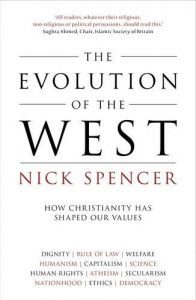What Has Christianity Ever Done For Us?
We owe a great deal to both the Moslems and Christianity for preserving and advancing math, philosophy and science from the Greeks. Catholic scholars embraced and preserved Plato, the Moslems, Aristotle. Scholars such as Roger Bacon introduced empirical thinking into Catholic philosophy, and others, such as Anselm, laid the foundations for modern philosophy. Moslem scholars advanced the field of mathematics, bridging the gap between classical and modern math.
Some of our civilization’s finest writers are monotheists, or were influenced by Christian, Jewish and Moslem thought.
We should never confuse Christianity with its advocates. Christianity, which was founded on tolerance, service and forgiveness mutated into the belief that truth was more important than people.1 Jesus would have challenged that proposition and Mohammed, although also a warlord, would have most likely rejected it as well.
1It’s easy to think this shift occurred with Christianity’s rise to political power in the fourth century, but violence between Christians can be traced back earlier—at least partially to the rise of official offices within the local churches. Politics has as much to do with violence as the misunderstanding of faith.back
Yes, I borrowed the title from the well-known Month Python sketch from Life of Brian.
Knowing my interest in religions and history, Electra got me The Evolution Of The West by Nick Spencer, based on a recent review by The Economist (from which I’m quoting below). A book that is doubly appropriate, as it examines the effect of Christianity on Western values, and argues that, to understand our present and shape our future, we really need to examine the past. And Christianity is a formative part of that past – surprisingly so for our secular times, when authors from Diderot to Richard Dawkins have raved about the triumph of secular man. What, after all, has Christianity ever done for us?
Rather a lot, argues Nick Spencer. Like a prophet crying in the post-modern wilderness, Mr Spencer provokes reflection that goes far beyond the shallow ding-dongs of the…
View original post 798 more words


Wind Eggs
As much as I admire Plato I think the wind eggs exploded in his face and that art and literature have more to tell us, because of their emotional content, than the dry desert winds of philosophy alone. ...more
- Phillip T. Stephens's profile
- 31 followers





